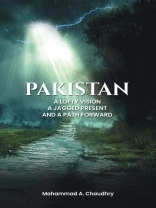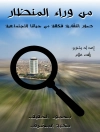‘It was a pleasant surprise for me Ashraf Chaudhry, a capable and inspiring professor of English Literature and my friend and my colleague of 35 years, turn into a forceful political analyst, an enlightened commentator of national and international affairs, and an active sponsor of interfaith harmony in a foreign land. I have been reading his discourses on varied subjects with interest and am always impressed by the deep thinking and extensive reading that goes into writing them.
This collection is a valuable contribution and should be welcomed by those who wish to read thoughts of a mature Pakistani mind in real perspective.
Prof. M. H. Hamdani, former Principal, F. G. Syed College, Rawalpindi
******
Mr. Ashraf Chaudhry is one of Pakistan Link’s most distinguished writers. His articles are studded with facts and figures that are strikingly revealing and wholly incontrovertible. The more learned and serious-minded readers admire Mr. Chaudhry for his insight, scholarship, and perspicacity.
Akhtar Mahmud Faruqui, editor, Pakistan Link.
******
‘In Rawalpindi, Professor Ashraf Chaudhry and I were neighbors. He was my senior. When the sub continent was divided in 1947, and PAkistan emerged as a new State, our parents migrated from the Indian territory to Pakistan. Prof. Chaundhry was a very brilliant and hard working student from his very childhood. He is a self-made man.
I have read some of his articles and columns in the Pakistan Link. I was much impressed by the candidness and clarity of vision he brings to his writings. He supports democrary and condemns dictaorship. He writes on human rights and human values and believes in the presence of goodness in all human beings. He rejects sectarian and radical approach in religion, and stresses on the need of a pluralist aspect of religion.
Often he underpins the problems, offers cautiously some solutions, and is never hesitant in naming the culprits. He rewards and censures the same political actors, depending on their performance, and hold no personal grudge against any one of them.’
Dr. Maqsood Jafri, author and political activist.
Giới thiệu về tác giả
FILIAL GRATITUDE
(A son on his father)
“Recently, one of my friends commented, ‘Your dad looks like your older brother.’ And this is so true! At the ripe age of 82, my father is physically fit and mentally alert. This book is proof of his vitality and vigor. Readers can discover the veracity of the above statement on their own. Here, I will attempt to highlight some other facets of his life that can further facilitate the readers to get a meaningful peep into the life of this resilient man.
Nothing came easy to him; he had to carve his own path in this world. He was born in India in 1942 but had to migrate to Pakistan at the age of 5, first virtually rotting in the camps and then reaching Pakistan riding an ox-driven cart. He excelled at school in the 50s and pocketed 200/200 on the Math paper in his Matriculation Examination in 1958—a fact he keeps mentioning relentlessly. His formal education virtually ended here, but he did not give up his dreams. He chose to go against the wishes of his somewhat disciplinarian father, who, like Abraham Lincoln’s father, did not see much value in higher education. He took up a job at the Telegraph office to support the family, and by incessantly performing night shift duties and attending private classes, he managed to get a BA Degree in 1962. While still performing night-shift duties, it was for the first time that he formally enrolled himself for his MA (English) studies at Gordon College in 1965. Later on, he made a stellar reputation as an English Language Professor at the famous Sir Syed College from 1969 to 1987. Between these 18 years, he joined the PAF as a Flying Officer in 1973, earned a British Council Scholarship for Higher Studies at the University of Exeter, UK, in 1977–78, and a deputation to teach at the International School/College at Jeddah in 1983. He let go of his about 20-year service and pension and chose to migrate to the USA in 1987, solely for the quality education of his children.
You may ask, “What is the secret of his enviable ‘youth’ and resilience?”
To put it simply, he is still found stretching his muscles, taking long walks, watching what he eats, making trips to the local library, reading books and taking notes on his note-pad, giving speeches, writing articles, and mentoring young kids at the mosque he founded in 1998. In other words, he keeps his mind and body actively engaged in social well-being activities on a daily basis.
“And what about his intellectual and spiritual health?”
In the spiritual realm, he is a late bloomer. I do not remember him praying or reading the Quran on a regular basis. However, it was after he migrated to the USA that he felt that he needed to correct this apparent deficiency. Now, he is frequently seen reading the Quran before the Fajr prayer and praying five times with the punctuality of a Maulvi. Yet, he still does not sport a beard, nor does he carry a Tasbeeh. All in all, he’s moderate with progressive and liberal leanings.
Such moderation and progressive ideas are enshrined in his articles. He’s objectively critical and yet hopeful, with ill will towards none. He’s moderate yet relentless in his attacks on corruption. He’s an admirer of sound character, which includes honesty and justice, and, of course, he hates blind hero-hero-worship. His articles are not an aerial view of Pakistan and its politics as presented by the rich and comfortably retired bureaucrats, super-rich politicians, and retired army generals. Certainly not. His articles carry a tinge of bitterness and frustration that the common people living in Mohallahs carry in their hearts. He is often heard saying, “Where is Pakistan’s Rushmore?” symbolically representing the character-in-leadership qualities of presidents, namely George Washington, Thomas Jefferson, Abraham Lincoln, and Theodore Roosevelt. Can people in Pakistan come out with a total agreement on any four Prime Ministers/Presidents? Beyond the name of the Founder of Pakistan, any other name would be a depiction of personal likes and dislikes, not of character. And character is destiny.
All in












